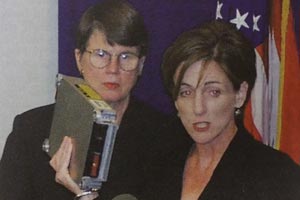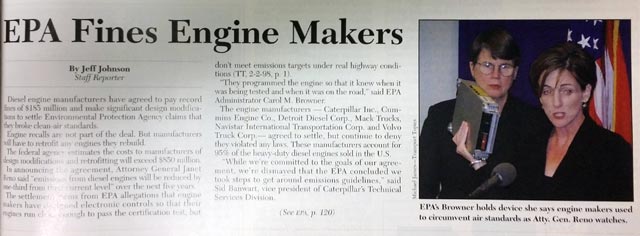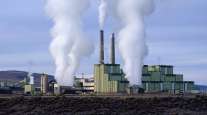Volkswagen Scandal Harkens Back to Truck Engine Makers’ 1998 Battle With EPA

 From October 1998: EPA’s Carol Browner holds device she says engine makers used to circumvent air standards as Attorney General Janet Reno watches.
From October 1998: EPA’s Carol Browner holds device she says engine makers used to circumvent air standards as Attorney General Janet Reno watches.The U.S. Environmental Protection Agency said Volkswagen cheated on air-pollution rules for its diesel cars with a defeat device, reminiscent of 1998 when heavy-duty truck manufacturers were doing the same thing.
Seventeen years ago, EPA said engine manufacturers were designing their engines’ computers specifically to circumvent federal standards.
With the software, the engine would run cleanly for the five minutes it would take for an emissions test but begin emitting illegal levels of nitrogen oxide soon after.
“So basically what happens is the computer system senses the timing and other things like speed and temperature, so that as long as you’re under conditions similar to the federal test procedure you’re fine, but otherwise NOx doubles or triples,” Margo Oge, director of EPA’s Office of Mobile Sources, said at the time.
Caterpillar Inc., Cummins Engine Co., Detroit Diesel Corp., Mack Trucks, Navistar International Transportation Corp. and Volvo Truck Corp. negotiated a consent decree with the EPA and the Department of Justice to settle the allegations.
In fact, Automotive News reports that engineer David Carder, who leads a research team at West Virginia University that uncovered the VW emissions flaw, also belonged to a WVU team that pioneered portable emissions testing as part of the 1998 settlement.
The way EPA acted in the matter “borders on a crime,” Stephen Homcha, vice president of engineering and product planning for Mack, told Transport Topics at the time.
“They held a gun to our head by threatening to withhold certification for 1999,” Homcha said.
“I’m a manufacturer who feels he’s been treated unfairly,” he added. “Looking at the level of penalties against a regulation and a test procedure that was very much set by EPA, it appears that the actions and the settlements were very severe on the engine manufacturers.”
The six major engine manufacturers accused of cheating on engine emissions tests ended up settling for $1.3 billion with the federal government.
Volkswagen AG has admitted that 11 million vehicles were equipped with diesel engines at the center of a widening scandal over faked pollution controls that will cost the company at least $7.3 billion, Bloomberg News reported. CEO Martin Winterkorn resigned on Sept. 23.
“Our company was dishonest with the EPA and the California Air Resources Board and with all of you,” Michael Horn, head of the VW brand in the United States, said Sept. 21 in Brooklyn, New York, where he was revealing a redesigned version of the Passat. “We have totally screwed up. We must fix the cars to prevent this from ever happening again, and we have to make this right. This kind of behavior is totally inconsistent with our qualities.”




